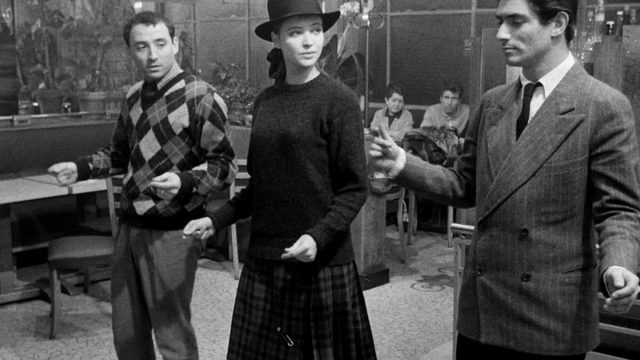“Isn’t it strange how people never form a whole?” – Franz
“In America we have only the bourgeoisie, and the love of the heroic is one of the few counterpoises available to us. “ – Allan Bloom, The Closing of the American Mind
Band of Outsiders lies under the fingernails of Reservoir Dogs, The Doom Generation, and the existentialist crime novels of Jean Patrick Manchette and Pascal Garnier, their self-conscious cool, their defining of the social order as immoral and omnipresent. Outsiders and Breathless feature characters who think in terms of the cinema and find the real capitalist world around them rather lacking: they commit crimes but these are always lacking in grandeur, in the power of the screen that has taken a hold of them. They have “romances” but they’re often hollow and shatter easily under pressure from outside forces (though Odile and Franz have a happy ending in this case). Like the rest of the West, Franz and Arthur and Odile have been warped and broken by consumerism and post war individuality. Yet Godard shows moments of joy and giddy fun amid a bland, boring life that is suffocating his subjects (he and Fever Ray would have a lot to talk about).
The film follows Arthur and Franz, two young schmucks who recruit Odile (Anna Karina), a student in their English language class, to rob her employer. They are both fans of the cinema, playing with finger guns and going “Blam! Blam!” as if reenacting a shoot out that will never happen. Arthur has been seeing Odile already as signaled by her refusal of Franz’s cigarettes for Arthur’s when offered, while Franz is entranced upon introduction. In between their meeting and the robbery the trinity famously dance in a cafe, run through the Louvre, and Arthur pledges his love to Odile (while chiding her to Franz as an idiot) until a surprisingly brutal third act.
The relationships here are as defined by their slipperiness as their sometimes genuine tenderness. Arthur is a harder, slightly rougher man than Franz, who in his fedora and coat strikes the same figure of poseurdom as Michel, and while Arthur says all the right things its Odile and Franz who share more of a natural bond in their tendency towards poetics. Odile is a touch naive – when Arthur wants to French kiss her she sticks her tongue out – but is also not as dumb as he believes. Watch her shoot down a flirty guy in the bathroom or gage Franz’s interest in her quite quickly. None of the characters are truly opaque; the jarring third person narration describes much of their feelings and inner curiosities. Its that none of them really know who they are, what they want, little beyond their immediate impulses and the art they’ve absorbed as gospel (a dozen teen films after this could have the same description). They’re young, in love, and they kill people, as the tagline would later go, and this is all they have at hand. Its as if French capitalist life has robbed them of their self-knowledge, of anything beyond image.
And the images are winking, jarring, even despairing, like the hard cut from a close up of Karina’s singing face to the Liberte subway stop, as if this is all that’s left of the ideas of the Revolution. Where Breathless was more of a guerilla film, made for cheap and using DIY techniques for capturing shots, Outsiders was made for 120,000 US dollars and it feels like a more confident and professional film. This doesn’t necessarily make it a better movie (Breathless still has a cheeky rawness) but it shows Godard becoming a better director, more able to handle himself and his own knack for experimentation. Like Breathless, Outsiders is distinctly aware that it is a film or a work of fiction even if that doesn’t mean the characters become metafictional. When the “band” take a minute of silence the sound actually drops out for 36 jarring seconds. The narration seems taken out of the novel its adapting, as if Godard is saying “Why yes, this is based on a novel you know.” Even the ending hilariously promises a sequel the smartass almost certainly knew would never happen. His genius was to make a film that understands its nature even if his characters cannot comprehend theirs.
In Band of Outsiders Godard depicts the growing ennui of youth and telegraphs the eventual attempted explosion of new ideas and lifestyles that tried to counteract this tedium. As shown in the descendents of his work that didn’t entirely happen, but Godard’s influence has spread into the corners of intellectual pop culture. There’s something of his pop nihilism even in Rick & Morty and Bojack Horseman, You’re The Worst. Yes, these shows say, the capitalist system is clearly not working and America, hell the universe, is a corrupted, evil place against which we have no significance. But we just have to find our happiness elsewhere, in enjoying each other and our brief timeframe on our planet as best we can (Rick Sanchez is defined by his inability to do this). Franz despairs over the impossiblity of real connections near the end of the film but Odile embraces their burgeoning relationship, finding hope in a life on the run and new beginnings in Brazil.
Godard of course would snort now at Voltaire’s idea of “planting our own garden”: he demands more out of us and from his art than this. But Band of Outsiders comes from a pre-Maoist Godard, from a Marxist thinker who still had no strict answers about the aimlessness that seemed to permeate an uncinematic culture. Best to play with image and technique, to depict his characters running, fighting, killing, taking part in an unconscientious dance that could stretch into the far corners of Western imagination in its ease, its sheer impossible joy.

